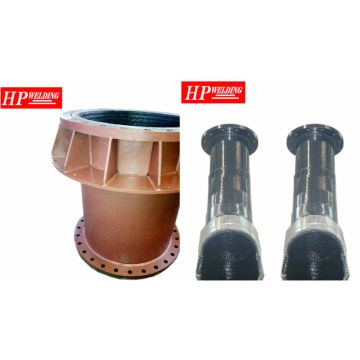

At present, the elbow flowmeter produced by many manufacturers of elbow flowmeters is a 90-degree elbow with a standard geometry, and the construction party installing the throttling element often directly installs the elbow directly in a suitable space, but The effect of flow measurement is not very satisfactory.
Composite Overlay Elbows are suitable for extremely severe abrasive wear and moderate to low impact.
Weld overlay cladding is a process that provides protection for metallic components by welding a layer of abrasion-resistant alloy to areas at risk of wear. It can be applied to an entire component, or only to specific areas of concern. Typical components clad by HP Welding include pipes, valves, flanges, connectors, and elbows, as well as more complex geometries such as tee pieces and wye pieces.
Typical materials for cladding in common use at HP Welding include HP700, HP700S, HP750X, HP750P and stainless steels, as well as many less common alloys.
With over 30 years of experience on the production of hardfacing products, and the technical expertise to back them up, HP Welding can meet any base material and cladding combination.
The advantages of HP Hardfacing Elbows
1. Flat surface and nice appearance
2. Good weldability to others working pieces
3. Excellent wear resistance
HP Hardfacing Elbows can be widely applied to mining site, cement plant, metallurgical equipment, dredging and power generation and any other fields where need to combat with abrasion.

